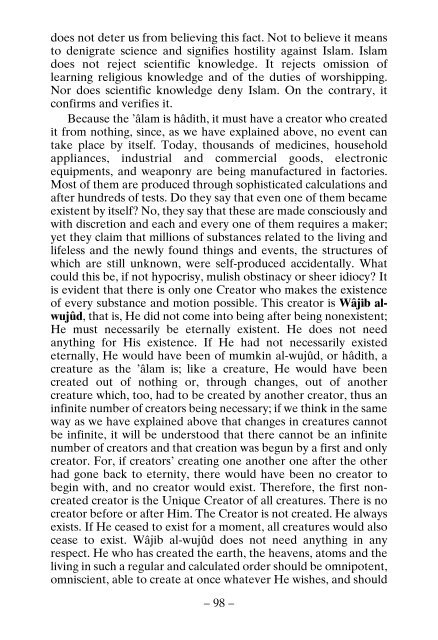Belief and Islam
BELIEF AND ISLAM star This work, Belief and Islam, originally was written in Persian under the title I’tiqâd-nâma by Hadrât Mawlânâ Khâlid al-Baghdâdî, a profound ‘âlim of Islam and a specialist in ma’ârif of tasawwuf. Hâji Faydullah Effendi of Kemah, a khalîfa of great walî Mavlânâ Mahmûd Sâhib, the brother of the author, translated the book into Turkish and named it Farâid-ul-fawâid which was printed in Istanbul in 1312 A.H.[1894]. Our bookstore had it translated again from the Persian original into Turkish and, some explanations and three chapters, published it with the title Imân ve Islâm in 1966. German, French and Arabic versions are also published by our bookstore. This book, explains five fundamentals of Islam, six fundamentals of îmân and the contemporary information about the matter and refutes those who are against Islam and those who are lâ-madbhabî.
BELIEF AND ISLAM
star This work, Belief and Islam, originally was written in Persian under the title I’tiqâd-nâma by Hadrât Mawlânâ Khâlid al-Baghdâdî, a profound ‘âlim of Islam and a specialist in ma’ârif of tasawwuf. Hâji Faydullah Effendi of Kemah, a khalîfa of great walî Mavlânâ Mahmûd Sâhib, the brother of the author, translated the book into Turkish and named it Farâid-ul-fawâid which was printed in Istanbul in 1312 A.H.[1894]. Our bookstore had it translated again from the Persian original into Turkish and, some explanations and three chapters, published it with the title Imân ve Islâm in 1966. German, French and Arabic versions are also published by our bookstore. This book, explains five fundamentals of Islam, six fundamentals of îmân and the contemporary information about the matter and refutes those who are against Islam and those who are lâ-madbhabî.
You also want an ePaper? Increase the reach of your titles
YUMPU automatically turns print PDFs into web optimized ePapers that Google loves.
does not deter us from believing this fact. Not to believe it means<br />
to denigrate science <strong>and</strong> signifies hostility against <strong>Islam</strong>. <strong>Islam</strong><br />
does not reject scientific knowledge. It rejects omission of<br />
learning religious knowledge <strong>and</strong> of the duties of worshipping.<br />
Nor does scientific knowledge deny <strong>Islam</strong>. On the contrary, it<br />
confirms <strong>and</strong> verifies it.<br />
Because the ’âlam is hâdith, it must have a creator who created<br />
it from nothing, since, as we have explained above, no event can<br />
take place by itself. Today, thous<strong>and</strong>s of medicines, household<br />
appliances, industrial <strong>and</strong> commercial goods, electronic<br />
equipments, <strong>and</strong> weaponry are being manufactured in factories.<br />
Most of them are produced through sophisticated calculations <strong>and</strong><br />
after hundreds of tests. Do they say that even one of them became<br />
existent by itself? No, they say that these are made consciously <strong>and</strong><br />
with discretion <strong>and</strong> each <strong>and</strong> every one of them requires a maker;<br />
yet they claim that millions of substances related to the living <strong>and</strong><br />
lifeless <strong>and</strong> the newly found things <strong>and</strong> events, the structures of<br />
which are still unknown, were self-produced accidentally. What<br />
could this be, if not hypocrisy, mulish obstinacy or sheer idiocy? It<br />
is evident that there is only one Creator who makes the existence<br />
of every substance <strong>and</strong> motion possible. This creator is Wâjib alwujûd,<br />
that is, He did not come into being after being nonexistent;<br />
He must necessarily be eternally existent. He does not need<br />
anything for His existence. If He had not necessarily existed<br />
eternally, He would have been of mumkin al-wujûd, or hâdith, a<br />
creature as the ’âlam is; like a creature, He would have been<br />
created out of nothing or, through changes, out of another<br />
creature which, too, had to be created by another creator, thus an<br />
infinite number of creators being necessary; if we think in the same<br />
way as we have explained above that changes in creatures cannot<br />
be infinite, it will be understood that there cannot be an infinite<br />
number of creators <strong>and</strong> that creation was begun by a first <strong>and</strong> only<br />
creator. For, if creators’ creating one another one after the other<br />
had gone back to eternity, there would have been no creator to<br />
begin with, <strong>and</strong> no creator would exist. Therefore, the first noncreated<br />
creator is the Unique Creator of all creatures. There is no<br />
creator before or after Him. The Creator is not created. He always<br />
exists. If He ceased to exist for a moment, all creatures would also<br />
cease to exist. Wâjib al-wujûd does not need anything in any<br />
respect. He who has created the earth, the heavens, atoms <strong>and</strong> the<br />
living in such a regular <strong>and</strong> calculated order should be omnipotent,<br />
omniscient, able to create at once whatever He wishes, <strong>and</strong> should<br />
– 98 –

















